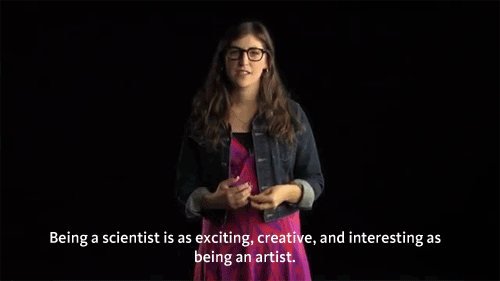I also got to present at one of the session times! I wanted to connect a few high--quality (read: my personal favorite) books to fun things kids can do after school, and talk a little about why that's important.
Here's some highlights:
We’re sciencing all the time. Science and math are our default modes of existing. They are why we don’t bump into stuff ALL the time-- because our brains are making spatial reasoning determinations. And why we don’t go around eating spoiled food unless we like to live really dangerously-- our noses are fine-tuned to pick up the scents created by the chemical changes that happen when food spoils. Or why we can focus on one thing when there are so many distractions around-- our brains can organize priorities through algorithms that we help create by our choices everyday.
STEM is a spectrum. For instance, technology can be a program involving coding and robots, which could be awesome; but it could also be a program where kids practice hand-eye coordination or writing and following recipes, both of which are skills you use when you engage with technology.
Reading aloud helps reach hard-to-reach kids. When we’re younger, we learn to read; but once we get into grade school, we’re expected to read to learn. What about the kids who don’t yet have the grasp on reading-- what can they learn through reading? According to the Common Core appendix, listening comprehension outpaces reading level until at least middle school. And it’s important that this is the case, since when we encounter a new word it’s easier to figure out what it is if we've heard it before. Also, have you ever heard a child read aloud and they read like a robot? They may not have heard enough people read aloud in their lives to internalize the prosody of stories. The sing-songy, ethereal sound of reading aloud actually helps the reader slow down their mind and comprehend the text. So reading aloud to students can actually help them with their reading!
Reading aloud also helps you all to make connections together! The Common Core Appendix also acknowledges the importance of collaborating with adults over text! Not that everything has to relate back to the Common Core, of course, but it’s a great language to know when you want to form a closer partnership with the public school or if you’re a grant-funded program. Sharing an experience through reading aloud helps kids add the new information to their schema, which is kind of like a map their brain makes with roads connecting everything they know.
I modeled parts of the programs below by reading aloud from the books and sharing the activities that we did in each program. Attendees even got to try some out!
Illusionology
Sasquatch Escape
I Survived the Shark Attacks of 1916
Wild Records
And of course, here's the slide deck. Thanks to Amy for using pictures from jdhancock's Flickr stream for one of her presentations, because his Creative Commons-licensed photos made this slide deck fun!
And here's a link to the digital hand out!
If you're interested in attending another non-librarian conference that can definitely help to inform your practice: Momentus Institute, where my sister Anna works, is holding an amazing-sounding conference about the roles adults can play in the lives of children called "Changing the Odds". The two full-day conference will take place in Dallas, TX, October 1-2. Early bird rates are applicable til June!



No comments:
Post a Comment